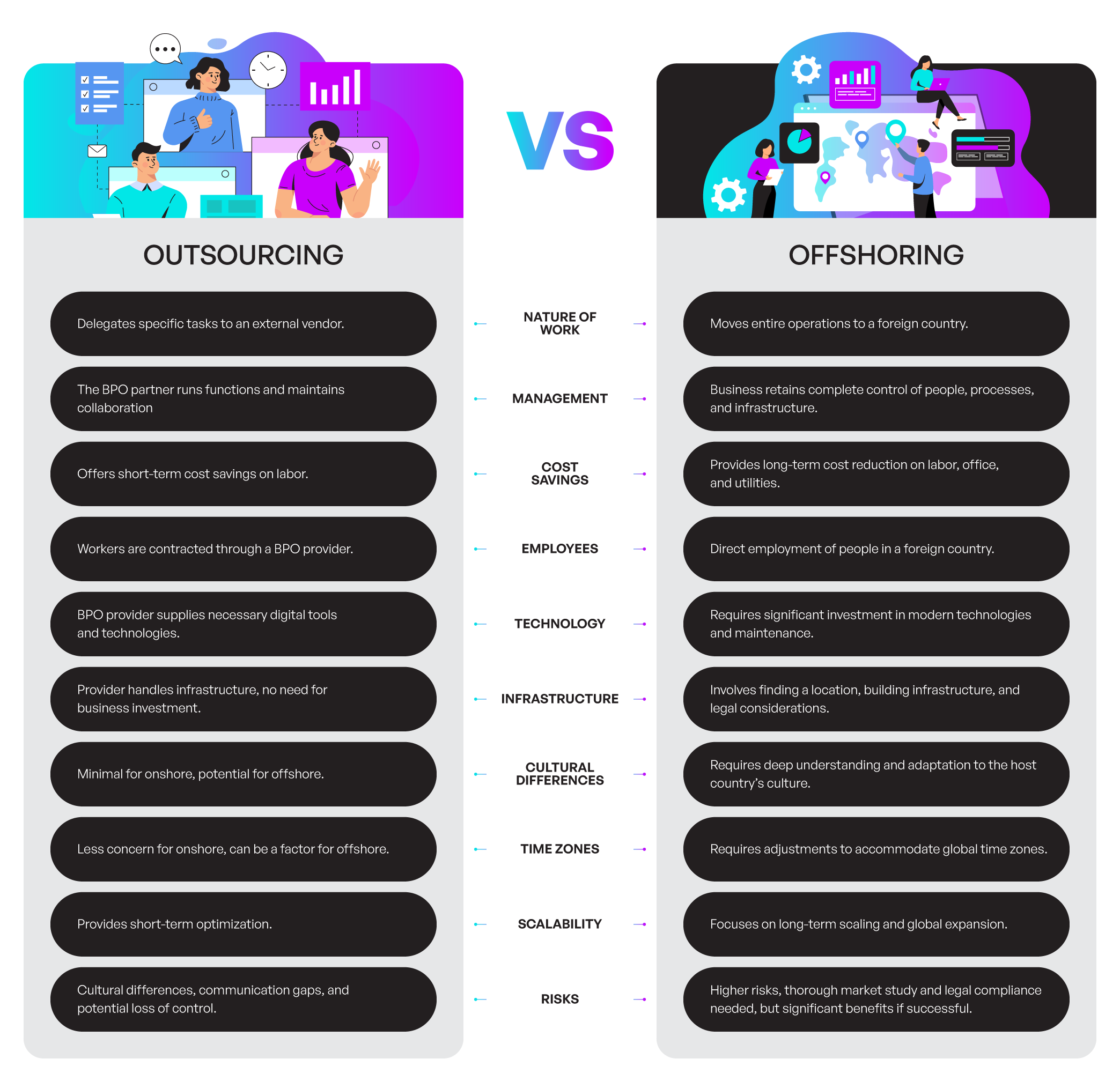Table of Contents
- Introduction
- Key Differences Between Outsourcing and Offshoring
- 10 Fast Facts about Outsourcing & Offshoring
- What’s Better for Your Business?
- Conclusion: A Summary of the Blog.
Well, you may have heard these terms being used interchangeably or even used outsourcing and offshoring as synonyms yourself. Guess what—they’re not the same. Although outsourcing and offshoring are often used interchangeably, they are distinct concepts with different meanings and applications. Understanding the difference between these two business strategies is important for companies aiming to optimize their operations.
So, let’s decode the differences & similarities between Outsourcing and Offshoring.
Differences Between Outsourcing and Offshoring at a Glance

To sum it up, outsourcing involves delegating specific tasks to an external vendor, either domestically or internationally, allowing businesses to focus on their core competencies while external specialists handle delegated tasks. It offers short-term cost savings and flexibility but can present challenges such as communication gaps and dependency on third-party providers. On the other hand, offshoring involves moving entire operations to a foreign country to reduce costs and increase efficiency. This strategy provides significant long-term cost savings and total control over processes but requires substantial initial investment and adaptation to cultural differences and time zone adjustments.
10 Fast Facts About Outsourcing and Offshoring
- The global outsourcing market is projected to reach $512.4 billion by 2030, reflecting continuous growth in the industry.
- In 2024, the United States’ business outsourcing sector is expected to generate $134 billion in revenue.
- Companies can save up to 70% on operational costs by offshoring to countries like the Philippines.
- Approximately 300,000 jobs are outsourced from the United States each year.
- India remains the top destination for IT outsourcing, contributing significantly to its GDP.
- Japan’s business process outsourcing market is projected to reach $38 billion by 2025.
- Around 59% of businesses outsource to reduce costs.
- Nearshore outsourcing is gaining popularity due to fewer language barriers and time zone differences.
- The global market for business process outsourcing was worth $261.9 billion in 2022 and is expected to grow at a rate of 9.4% annually.
- Companies that outsource HR functions can save an average of 27.2% on related costs.
What’s Better for Your Business?
Choosing between outsourcing and offshoring depends on your business goals and operational needs. Outsourcing is best for companies seeking short-term cost savings, quick access to specialized skills, and minimal investment in infrastructure. It provides flexibility, access to expertise, reduced operational costs, and the ability to focus on core business activities. However, it may present potential communication gaps, dependency on third-party providers, and limited control over processes.
Offshoring, conversely, is best suited for companies aiming for long-term cost reduction, global expansion, and total control over operations. It offers significant cost savings, scalability, process control, and access to a worldwide talent pool. However, it may involve cultural and language barriers, time zone differences, and substantial initial investment.
Conclusion
The global outsourcing market is projected to reach $512.4 billion by 2030, and the United States’ business outsourcing sector alone is expected to generate $134 billion in revenue by 2024; the importance and impact of these strategies cannot be overstated. Outsourcing and offshoring offer unique benefits tailored to different business needs, whether achieving short-term cost savings and operational flexibility through outsourcing or leveraging the significant cost reductions and global talent pool provided by offshoring.
Understanding these differences is crucial for making informed decisions that align with your business objectives. At AffinityCore, we provide expert guidance and tailored solutions to help you navigate the complexities of these strategies, ensuring you can maximize efficiency, drive growth, and stay competitive in a rapidly evolving market.
Unlock the potential of your business with AffinityCore’s tailored outsourcing and offshoring solutions.
Contact us for a consultation and let us help you achieve unparalleled growth and efficiency.



